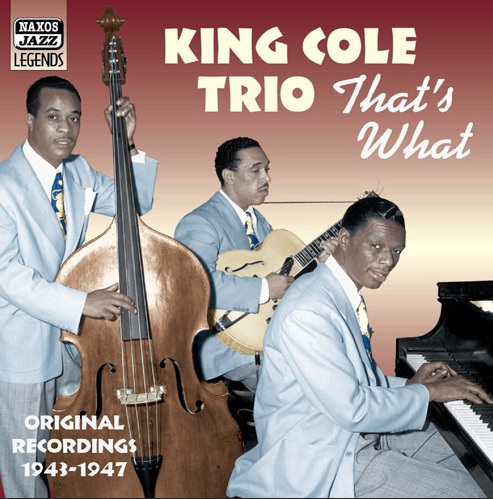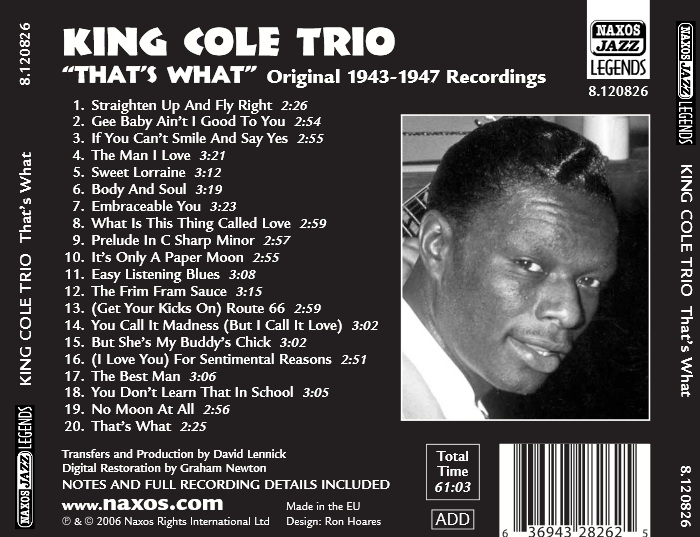Logowanie
Dlaczego wszystkjie inne nie brzmią tak jak te?
Chai Lang, Fan Tao, Broadcasting Chinese Orchestra
Illusive Butterfly
Butterly - motyl - to sekret i tajemnica muzyki chińskiej.
SpeakersCorner - OSTATNIE!!!!
RAVEL, DEBUSSY, Paul Paray, Detroit Symphony Orchestra
Prelude a l'Apres-midi d'un faune / Petite Suite / Valses nobles et sentimentales / Le Tombeau de Couperin
Samozapłon gwarantowany - Himalaje sztuki audiofilskiej
PROKOFIEV, Stanislaw Skrowaczewski, Minneapolis Symphony Orchestra
Romeo and Juliet
Stanisław Skrowaczewski,
✟ 22-02-2017
BARTOK, Antal Dorati, Philharmonia Hungarica
Dance Suite / Two Portraits / Two Excerpts From 'Mikrokosmos'
Samozapłon gwarantowany - Himalaje sztuki audiofilskiej
ENESCU, LISZT, Antal Dorati, The London Symphony Orchestra
Two Roumanian Rhapsodies / Hungarian Rhapsody Nos. 2 & 3
Samozapłon gwarantowany - Himalaje sztuki audiofilskiej
Winylowy niezbędnik
ClearAudio
Cartridge Alignment Gauge - uniwersalny przyrząd do ustawiania geometrii wkładki i ramienia
Jedyny na rynku, tak wszechstronny i właściwy do każdego typu gramofonu!
ClearAudio
Harmo-nicer - nie tylko mata gramofonowa
Najlepsze rozwiązania leżą tuż obok
IDEALNA MATA ANTYPOŚLIZGOWA I ANTYWIBRACYJNA.
Wzorcowe
Carmen Gomes
Celebrating the art and spirit of music - vol. 5 - Reference Songs
- CHCECIE TO WIERZCIE, CHCECIE - NIE WIERZCIE, ALE TO NIE JEST ZŁUDZENIE!!!
Petra Rosa, Eddie C.
Celebrating the art and spirit of music - vol. 3 - Pure
warm sophisticated voice...
SAMPLER - STS DIGITAL, Gregor Hamilton
Celebrating the art and spirit of music - vol. 2 - Love songs from Gregor Hamilton
...jak opanować serca bicie?...
SAMPLER - STS DIGITAL
Celebrating the art and spirit of music - vol. 1 - Leonardo Amuedo
Największy romans sopranu z głębokim basem... wiosennym
Lils Mackintosh
Celebrating the art and spirit of music - vol. 4 - A Tribute to Billie Holiday
Uczennica godna swej Mistrzyni
Nat King Cole Trio
That's What

- Nat King Cole Trio - group
Original Recordings 1943 - 1947
>>> Większa okładka A <<< >>> Większa okładka B <<< Limelight Magazine, March 2007 "A wonderful trio at it's artistic peak showing Cole’s brilliant creativity as a pianist before it was overshadowed by his silken vocals." "Nat 'King' Cole (1919-1966) broke so many barriers during his reign as a recording artist that it's hard to keep them all straight. He virtually invented the musical concept of the piano trio at a time when boisterous big bands were the order of the day. His piano playing brought the style and swing of Earl Hines into the post-World War II world of introspective, small club jazz. And his velvety vocals would eventually surpass his piano prowess in popularity to not only make him America's first successful black ballad singer, but one of the great vocalists of all time. Nathaniel Adams Coles was born on St Patrick's Day, 17 March 1919 in Montgomery, Alabama, the youngest of four children. His father was a grocer, a sensible job for one with six mouths to feed. In the early twenties, the family moved to Chicago, part of the great Northern migration of African-Americans, hoping to escape the brutal life their race led in the South. Upon arrival, Nathaniel's father gave up the grocery business to become a minister. A musical prodigy, Nat grew up in Chicago at an opportune time, with the sounds of Earl Hines and Jimmie Noone streaming from nightclubs and on radio. His brother Eddie, a bassist, toured with Noble Sissle's jazz band in Europe, while Nat developed a reputation around town as a budding genius on the piano. An appearance by Earl Hines at the Regal Theater in 1931 changed Nat's life forever. He took to copying Hines' style, even going so far as to sit sideways at the piano, with cascades of notes pouring from his fingers. By late 1934, Nat was leading his own ten-piece band, the Royal Dukes, copying Hines' arrangements, which led to the renaming of his group to the Rogues of Rhythm. A turning point in Cole's career came on 8 September 1935, when his band of teenagers faced off with Hines in a battle of the bands. By the time he was seventeen, Nat Cole had eloped, arriving in California with a touring company of Shuffle Along. When the show folded, he decided to remain in Los Angeles, where he jammed at clubs with his friend Lee Young, younger brother of saxophone great Lester Young. In the late '30s, Cole met bassist Wesley Prince and guitarist Oscar Moore, forming a trio that played down-and-out clubs, chicken shacks, and steak houses in addition to making transcriptions as Nat Cole's Swingsters. Recording for Decca in 1940 and 1941, the trio found new audiences for their lightly swinging jazz. In 1942, Prince was drafted and was replaced by Johnny Miller, but the musician's union forbade the trio from making new records for Decca in 1942. With Decca on strike along with RCA Victor and Columbia, Cole went searching not only for a new record label, but also for a manager and a song that might break them out of the race market and into the popular mainstream. The song that did the trick was Straighten Up And Fly Right, a whimsical fable about a monkey who takes a ride on a buzzard that doubled as a parable for race relations in the 1940s. Cole wrote the song in the winter of 1943 while playing in Omaha, Nebraska, where there was nothing to do in his off-hours except write songs. Cole would later explain that he got the idea for the song from one of his father's sermons. It became a hit with overseas soldiers, and the title a catchphrase for line officers in dressing down their troops. Soon afterward, Cole met Carlos Gastel, who had heard Nat sing Jimmie Noone's theme song, "Sweet Lorraine", at the 331 Club. Gastel signed on to become the Trio's manager, and within three weeks, had them booked into Los Angeles' Orpheum Theater at $800 a week. Several weeks later, Gastel had secured the Trio a seven-year contract with Capitol Records, a brand-new label founded by music shop owner Glenn Wallichs, songwriter Johnny Mercer, and producer/writer Buddy DeSylva. With shellac in short supply due to the war, it was Wallichs' idea to buy up old records at six cents a pound and grind them up to produce new discs. Wallichs had seen Cole before when the Trio had played at the opening of his shop. Capitol Records was the first label to break down the barriers of racial discrimination in the record industry. Before Capitol, the major labels had segregated their black artists by marketing them separately, placing them on specialized 'race' labels, such as Decca's 'Sepia' series, on which Cole's first commercial records were released. Believing that white artists were more marketable than black artists, the labels myopically poured more promotion and advertising money into white performers' records. Capitol did no such thing, integrating the Trio into its regular lineup of artists that included Jack Teagarden, Mercer, and Ella Mae Morse. The first session was held on 30 November 1943 at the MacGregor Studios on Melrose Avenue. Bandleader Paul Weston was in the control booth along with engineer John Palladino while Mercer supervised the session. Despite signs saying 'Positively No Smoking', Cole balanced a smoldering Philip Morris cigarette on a glass ashtray on the studio piano. Johnny Mercer had a marked presence on the session since he chose much of the material to be recorded, helping with the arrangements, and balancing the sound. At the second session, held a few weeks later, Cole recorded Sweet Lorraine, singing behind the beat as Billie Holiday had taught him. He was beginning to come into his own as a singer, using his warm, intimate voice and delivery that reflected the sincerity and honesty of his own personality. And thanks to Mercer, Cole's vocals weren't just limited to jive novelty songs that had been sung by singers like Cab Calloway, Louis Jordan, and Slim Gaillard. For the first time, a black man was singing love songs that were being released on a label geared to a general audience that included white as well as black women. Many of the ballads that he sang were from America's great songwriters: George & Ira Gershwin (Embraceable You), Cole Porter (What Is This Thing Called Love), and Harold Arlen & Yip Harburg (It's Only A Paper Moon). Although Cole was steadily emphasizing vocals over his piano playing, there was still room to showcase his incredible musical talents – we've selected his stunningly inventive interpretation of Rachmaninov's Prelude in C Sharp Minor for this collection, in which Cole and Moore trade licks that show them moving far beyond the normal riffs and take-offs of the Swing Era, incorporating a sophisticated yet still swinging sensibility into the work. Another instrumental is the laconic Easy Listening Blues, with songwriting credit given to Cole's first wife, Nadine Robinson. Guitarist Oscar Moore, an integral part of the Trio, was given plenty of opportunities to shine as well, especially in such songs as Body and Soul, in which he contributed a lengthy solo that showed him moving beyond the more virtuosic solos associated with Charlie Christian, combining his astounding technique with an innate sense of melodic invention. With Straighten Up and Fly Right selling a half million records, the Trio hit the big time, commanding five-figure fees for brief musical vignettes in films such as Pistol Packing Mama, and making frequent radio appearances for NBC and Armed Forces Radio. They performed nightly at the posh Trocadero Club in Hollywood and won a regular spot on Orson Welles' weekly radio show on CBS. The Trio's recordings were slowed down during much of 1944 and 1945 by the shortage of shellac during the waning years of World War II, but in the autumn they resumed their sessions with a song that became one of their biggest, and most controversial hits. The Frim Fram Sauce was written by ASCAP stalwarts Louis 'Redd' Evans and Joe Ricardel (short for Ricciardello), an innocuous bit of nonsense that ignited a scandal when CBS banned it because of its racy double-entendre lyrics likening food with sex. Carlos Gastel took advantage of the controversy by offering $5,000 to anyone who could decipher what the mysterious culinary ingredients ('Ausen fay and chefafa') referred to. Bobby Troup's paean to a rather drab interstate highway helped make U.S. Route 66 an icon for post-war American kitsch. Intrepid motorists have gone on driving expeditions to investigate the wonders of such previously obscure towns as Winona, Arizona and Gallup, New Mexico ever since. Although it wasn't until 'Nature Boy' and 'The Christmas Song' that Nat Cole's balladry finally made him a vocalist in the eyes of his audiences, there were earlier recordings that showed portents of this oncoming aspect of his career. One of these is (I Love You) For Sentimental Reasons, which he recorded while he was deciding to leave his first wife Nadine for singer Maria Ellington. There is no mistaking the sincerity in his performance of this song, which had been recorded a decade earlier by Mildred Bailey only to become Nat Cole's first number one hit. There have been a handful of jazz musicians who have shown the ability to sing and improvise on their instrument at the same time. But on That's What, Cole shows his ability to scat along with Oscar Moore's guitar solo in a similar style. Cole's jazz chops were being showcased less and less as the '40s wore on (they would all but disappear in the 1950s and '60s), but performances such as this still show Nat Cole to be one of the great jazz geniuses of our time." Cary Ginell Grammy-nominated writer/producer and winner of the ASCAP/Deems Taylor Award.
























